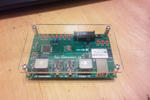趣味の電子工作と釣りについて。電子工作は、おもに変換器作成。釣りはおもにトラウトの管釣り。
テレビでGW初日とか言っていたので、ちょっと気まぐれで王禅寺ナイターへ。でも3連休ごときでGWなんて、おかしいんじゃね?と思うが。。。。
タックルベリー経営になってから2回目である。前回は会員証が無かったので割高だったけど、今回は会員証有りで。有りだと、昔の王禅寺とほぼ同じ金額になる。でもナイターは会員証ありでも以前より2割増くらい。タックルベリー経営になって悪くなったという話をよく聞くが、いい面もある。それは客が少なくなったこと。以前のバス停状態には、もうならないだろう。でも悪くなった点は数え切れない。高くなった、魚影が減った、電々ホタルちゃんが売ってなくなった、などいろいろ。電々ホタルちゃん、初心者にはお勧めのルアーだったんだけど、やはり電々があの企業を思い起こさせるからだめなんだろう。。。
それはさておき、ナイター20:00~21:30の釣果は、、、、大体10匹ちょっと。釣れない、ということはないけど、昔の王禅寺ナイターなら、この時期けっこういい感じで釣れていたので、そう考えるといまいち。サイズは小物ばっかり。前回は中物がけっこう混じったが、GWの子供向けに小物を多めにいれたのだろう。ただ、前回掛けたもののバラした鵜は今回かからなかった。まあ、あんなもの毎週掛かったら困る。
でも、日中あんなに暖かかったのに、ナイターは寒い。防寒具無かったら死んでいた。。。
タックルベリー経営になってから2回目である。前回は会員証が無かったので割高だったけど、今回は会員証有りで。有りだと、昔の王禅寺とほぼ同じ金額になる。でもナイターは会員証ありでも以前より2割増くらい。タックルベリー経営になって悪くなったという話をよく聞くが、いい面もある。それは客が少なくなったこと。以前のバス停状態には、もうならないだろう。でも悪くなった点は数え切れない。高くなった、魚影が減った、電々ホタルちゃんが売ってなくなった、などいろいろ。電々ホタルちゃん、初心者にはお勧めのルアーだったんだけど、やはり電々があの企業を思い起こさせるからだめなんだろう。。。
それはさておき、ナイター20:00~21:30の釣果は、、、、大体10匹ちょっと。釣れない、ということはないけど、昔の王禅寺ナイターなら、この時期けっこういい感じで釣れていたので、そう考えるといまいち。サイズは小物ばっかり。前回は中物がけっこう混じったが、GWの子供向けに小物を多めにいれたのだろう。ただ、前回掛けたもののバラした鵜は今回かからなかった。まあ、あんなもの毎週掛かったら困る。
でも、日中あんなに暖かかったのに、ナイターは寒い。防寒具無かったら死んでいた。。。
PR
情報処理技術者試験にDBスペシャリストというのがあるんだが、13年ぶりに受験してみた。
かる~く過去問眺めただけで、試験に臨んだ。けっこう忙しかったんだから仕方ない。先週はエビスサーキット行ったりしたりと。
午前IIまでは、まあ、なんとか。
午後Iを受けて、1時間ぐらいしたところで、なんか、こんな曲が、頭の中で鳴りだした。
謎の曲
。。。。
いや、一応午後IIも受けたよ。。。。午後IIは開始早々からずっと鳴り続けていて、うるさいったらありゃしない。みんな聞こえないのかな?俺だけかな?
で、どうであれ肩の荷が降りたので、これからはまたチューニング&電子工作再開!!BT Commander Pro完成させるぞ!!
かる~く過去問眺めただけで、試験に臨んだ。けっこう忙しかったんだから仕方ない。先週はエビスサーキット行ったりしたりと。
午前IIまでは、まあ、なんとか。
午後Iを受けて、1時間ぐらいしたところで、なんか、こんな曲が、頭の中で鳴りだした。
謎の曲
。。。。
いや、一応午後IIも受けたよ。。。。午後IIは開始早々からずっと鳴り続けていて、うるさいったらありゃしない。みんな聞こえないのかな?俺だけかな?
で、どうであれ肩の荷が降りたので、これからはまたチューニング&電子工作再開!!BT Commander Pro完成させるぞ!!
ヤフオクをなにげなく見ていたら、はるみのゲームライブラリが出品されていた。なつかしい。あぁ、チャイナシンドローム、やってみたいなぁ。。。どんなゲームだったか、忘れてしまっているんだけど。。。あのころは、あれが日本で起きるなんて、想像もしてなかったけど。。。
それはさておき、FCコマンダーのBluetooth対応版、じゃなくて、スマホでコマンダーっぽいことをするためのブツの基板を発注していて、先日届いたので早速組み立ててみた。
それがこれ

DIPスイッチは、ファーム書き換えとBluetoothモジュール初期化に使用するが、それ以外は未定。
LEDが10個も付いているけど、今のところ用途が決まっているのは6個。残り4個は未定。
別の角度から見ると、こんな感じ

左から、FCコマンダー接続用、外部入力1(シリアル)、外部入力2(シリアル)、パワーFC接続用、USB接続用
USBはファームウェア更新用だが、CDCクラスを使用すれば、FC ProやFC-Editが使えるはず。FC-HAKOみたいな感じかな?
FCコマンダーとUSBやスマホ(Bluetooth)の同時接続はできるが、FCコマンダーのパケットを優先するので、その他のパケットはパケ落ちする。なぜFCコマンダーを優先するか、というと、FCコマンダーは一定数連続してパケ落ちすると、COMMUNICATION ERRORとなって再起動するまで復活しないから。
一応、JZX100用(シリアル)とECR33用(低速SBI)の両方に対応しているが、ER34(高速SBI)には対応していないものと思われ。というか未確認。でも今のところファームウェアが別なので、チップを書き換えて対応。チップの書き換えはUSBPSDGOC同様、USB経由でできる。
外部入力は2つ。今のところ東名というかPLXのA/F計のデジタル出力にしか対応していないが、LVTTLレベルでもRS232Cレベルでも受けられるように設計してあるので、InnovateのA/Fでも、プログラムさえ書けば対応できるはず。PLXのブースト計、水温、油温、油圧とかも、シリアル出力なので、取れるはず(シリアルでシーケンシャルに流れてくるので1つの入力ポートですべて取れる)。
スマホというかAndroid用のプログラムは、Bluetooth Chatをベースに試作したものがあるのだが、どうも不安定。SJC-Pはなんとか取ったが、Javaでプログラミングなんてしたことないし、見よう見まねで何とか動かしたものの、起動したら終了できないし、無理やり強制終了するとメモリー内にゴミが残るのか、次に起動するとよく落ちる。
てな感じで、まだまだって感じ。
外販することはないと思うけど、売るとしてもあと1年くらいかかるかな?
それはさておき、FCコマンダーのBluetooth対応版、じゃなくて、スマホでコマンダーっぽいことをするためのブツの基板を発注していて、先日届いたので早速組み立ててみた。
それがこれ
DIPスイッチは、ファーム書き換えとBluetoothモジュール初期化に使用するが、それ以外は未定。
LEDが10個も付いているけど、今のところ用途が決まっているのは6個。残り4個は未定。
別の角度から見ると、こんな感じ
左から、FCコマンダー接続用、外部入力1(シリアル)、外部入力2(シリアル)、パワーFC接続用、USB接続用
USBはファームウェア更新用だが、CDCクラスを使用すれば、FC ProやFC-Editが使えるはず。FC-HAKOみたいな感じかな?
FCコマンダーとUSBやスマホ(Bluetooth)の同時接続はできるが、FCコマンダーのパケットを優先するので、その他のパケットはパケ落ちする。なぜFCコマンダーを優先するか、というと、FCコマンダーは一定数連続してパケ落ちすると、COMMUNICATION ERRORとなって再起動するまで復活しないから。
一応、JZX100用(シリアル)とECR33用(低速SBI)の両方に対応しているが、ER34(高速SBI)には対応していないものと思われ。というか未確認。でも今のところファームウェアが別なので、チップを書き換えて対応。チップの書き換えはUSBPSDGOC同様、USB経由でできる。
外部入力は2つ。今のところ東名というかPLXのA/F計のデジタル出力にしか対応していないが、LVTTLレベルでもRS232Cレベルでも受けられるように設計してあるので、InnovateのA/Fでも、プログラムさえ書けば対応できるはず。PLXのブースト計、水温、油温、油圧とかも、シリアル出力なので、取れるはず(シリアルでシーケンシャルに流れてくるので1つの入力ポートですべて取れる)。
スマホというかAndroid用のプログラムは、Bluetooth Chatをベースに試作したものがあるのだが、どうも不安定。SJC-Pはなんとか取ったが、Javaでプログラミングなんてしたことないし、見よう見まねで何とか動かしたものの、起動したら終了できないし、無理やり強制終了するとメモリー内にゴミが残るのか、次に起動するとよく落ちる。
てな感じで、まだまだって感じ。
外販することはないと思うけど、売るとしてもあと1年くらいかかるかな?
Autowayというタイヤの通販会社がある。それなりに安いのでたまに利用するのだが、
そのせいか、いろいろなホームページ(車と無関係)の片隅にAutowayの広告をよく
見かけるようになった。ときには、埋め込まれている8枚程度の広告がすべてAutoway
ということもあった。いくらなんでも、これは酷い。。。俺、そこまでタイヤ好きじゃないぞ。
Webサーフィンにうんざりして、懐かしのアニメでも見ようとYoutubeにつないだところ、
なんとここの広告もAutoway。。。なんか、漫画で昔あったな。。。勧誘かなんかで
訪問してきて、断ったら次は電話でよろしくお願いって言ってきて、これも断って
テレビつけたらテレビで同じこと言ってきて、チャンネル変えても全部同じ内容っ
てな感じのやつ。
それはさておき、ひさしぶりにFusionPCBに基板を発注したら、以前と手順が変わって
いた。ということで、その備忘録。
1.Seeed Studioのホームページから基板製作サービスを購入。これは以前と変わら
ないが、この時点でガーバーデーターの添付が必須になった。以前なら注文番号
を受け取って、それを基板にシルクで書き込んで、再度メールに添付して送る
必要があったのだが、ずいぶん楽になった。で、今回は3月16日に注文。
送料はもったいないので、無料のやつにした。
(Registered Air Parcel (Weight: 0.744kg. Delivery Time: 0-30 days))
2.同日中に、注文内容の確認メール(件名:Order Confirmation No: 752xx) と
いったメールが届く。
3.3月22日に下記のメールが届く。
Thank you for purchasing from us.Your order 752xxhas been updated
to the following status:
Shipped.
4.3月25日に下記のメールが届く。
Thank you for purchasing from us.Your order 752xxhas been updated
to the following status:
Traceable.
5.3月31日、到着
つまり、16日発注、22日出荷、31日到着、なので、発注から2週間で到着したことに
なる。無料なので船便かと思ったら、HK->NRT経由で来ているので、航空便のようだ。
まずまずかな。
.
そのせいか、いろいろなホームページ(車と無関係)の片隅にAutowayの広告をよく
見かけるようになった。ときには、埋め込まれている8枚程度の広告がすべてAutoway
ということもあった。いくらなんでも、これは酷い。。。俺、そこまでタイヤ好きじゃないぞ。
Webサーフィンにうんざりして、懐かしのアニメでも見ようとYoutubeにつないだところ、
なんとここの広告もAutoway。。。なんか、漫画で昔あったな。。。勧誘かなんかで
訪問してきて、断ったら次は電話でよろしくお願いって言ってきて、これも断って
テレビつけたらテレビで同じこと言ってきて、チャンネル変えても全部同じ内容っ
てな感じのやつ。
それはさておき、ひさしぶりにFusionPCBに基板を発注したら、以前と手順が変わって
いた。ということで、その備忘録。
1.Seeed Studioのホームページから基板製作サービスを購入。これは以前と変わら
ないが、この時点でガーバーデーターの添付が必須になった。以前なら注文番号
を受け取って、それを基板にシルクで書き込んで、再度メールに添付して送る
必要があったのだが、ずいぶん楽になった。で、今回は3月16日に注文。
送料はもったいないので、無料のやつにした。
(Registered Air Parcel (Weight: 0.744kg. Delivery Time: 0-30 days))
2.同日中に、注文内容の確認メール(件名:Order Confirmation No: 752xx) と
いったメールが届く。
3.3月22日に下記のメールが届く。
Thank you for purchasing from us.Your order 752xxhas been updated
to the following status:
Shipped.
4.3月25日に下記のメールが届く。
Thank you for purchasing from us.Your order 752xxhas been updated
to the following status:
Traceable.
5.3月31日、到着
つまり、16日発注、22日出荷、31日到着、なので、発注から2週間で到着したことに
なる。無料なので船便かと思ったら、HK->NRT経由で来ているので、航空便のようだ。
まずまずかな。
.
最近ちょっと暖かくなってきたので、日曜朝一王禅寺に行って来た。あたたかくなってきたといっても朝一は寒い。防寒対策はそれなりに必要かも。
例の事故で経営が変わってから初めてであったが、実質値上げされていた。タックルベリーの会員なら割引が効いて昔とそう変わらない料金になるが、会員になった当日は割引が使えない。なんだかなぁ。。。でも、値上げのおかげで、日曜にもかかわらず、1池でもかなり空いていた。2池はガラガラだけど、水が澱んでいて、だめだなこりゃって感じ。
で、釣果(1池)は、というと、3時間で15匹ちょっと程度と、この時期の王禅寺としてはいまいち。でも、4~5匹に1匹中物が混じって、昔の王禅寺で見かけた、なんじゃこれ?(悪い意味で)サイズは見かけなかった。
で、そのまま終了間際に、フォール直後に大物が掛かった。残念ながらラインブレークでネットインできなかったが、15分くらい格闘した。しかし、この真っ黒な大物、突然深く潜りだすだけじゃなく、空飛ぶんだから、手に負えない。う~。
例の事故で経営が変わってから初めてであったが、実質値上げされていた。タックルベリーの会員なら割引が効いて昔とそう変わらない料金になるが、会員になった当日は割引が使えない。なんだかなぁ。。。でも、値上げのおかげで、日曜にもかかわらず、1池でもかなり空いていた。2池はガラガラだけど、水が澱んでいて、だめだなこりゃって感じ。
で、釣果(1池)は、というと、3時間で15匹ちょっと程度と、この時期の王禅寺としてはいまいち。でも、4~5匹に1匹中物が混じって、昔の王禅寺で見かけた、なんじゃこれ?(悪い意味で)サイズは見かけなかった。
で、そのまま終了間際に、フォール直後に大物が掛かった。残念ながらラインブレークでネットインできなかったが、15分くらい格闘した。しかし、この真っ黒な大物、突然深く潜りだすだけじゃなく、空飛ぶんだから、手に負えない。う~。

